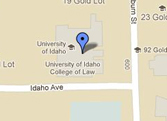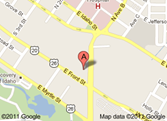College of Law
Moscow

uilaw@uidaho.edu
Administration Office: 208-885-2255
Dean’s Office: 208-885-4977
fax: 208-885-5709
Menard 101
711 S. Rayburn Drive
Mailing Address:
College of Law
University of Idaho
875 Perimeter Drive MS 2321
Moscow, ID 83844-2321
Boise
First Monday - March 3, 2008
In this issue:
- Legislation Relating to "Second Century" Initiative is Enacted
- Bellwood Lecturer and Schedule Are Announced
Legislation Relating to “Second Century” Initiative Is Enacted
As reported in last month’s “First Monday” e-brief, the Idaho Senate passed a bill, S.B. 1270, authorizing expansion of the Idaho Court of Appeals to meet current and future caseloads. The Senate also passed S.B. 1271, authorizing the Idaho State Law Library to be located at a site other than the Idaho Supreme Court Building. The legislation enables the Supreme Court to make room in its building for an expanded Court of Appeals, which will have outgrown the commercially leased office space it has occupied since the Court was created in 1982. The House of Representatives has now approved both pieces of legislation. If the Legislature appropriates funds this month to implement the Court of Appeals expansion and the Law Library relocation, the concept of an “Idaho Law Learning Center” will take an important step forward. The Learning Center is a collaborative proposal of the Supreme Court and the University of Idaho to provide a new facility for the Law Library and for an expanded College of Law presence in Boise, pursuant to the University’s plan to fulfill its statewide mission in legal education during the College’s “second century.” While planning and development of the Learning Center unfold, the Law Library would be housed temporarily in a building near the Supreme Court.
Further information about the “second century” planning process can be obtained from Dean Burnett (dburnett@uidaho.edu). Planning documents are posted on the College of Law website.
Bellwood Lecturer and Schedule Are Announced
The Sherman J. Bellwood Memorial Lecture for academic year 2007-08 will be delivered in Moscow on April 21, 2008, by Kenneth W. Starr, Dean of the Pepperdine University School of Law. Since its inception in 1997, the Bellwood Lecture series has provided a wide variety of perspectives and philosophies, expressed by speakers ranging from Supreme Court Justices O’Connor, Scalia, and Ginsburg, to then-Attorney General Janet Reno and U.S. Senators Gary Hart and Alan Simpson. Additional Bellwood Lecturers have included Minnesota Supreme Court Justice Alan Page; Helaine Barnett, President of the Legal Services Corporation; Bryan Stevenson, Executive Director of the Equal Justice Institute; the late David Halberstam; and distinguished academics Charles Wilkinson (University of Colorado) and Martha Nussbaum (University of Chicago).
This year’s Bellwood program will include a panel discussion in the College of Law courtroom the morning of April 21, followed by the Memorial Lecture in the afternoon at the University Administration Building Auditorium. The panel discussion is expected to explore diverse views on an issue of constitutional law, and the lecture to focus on the calling of lawyers to public and professional service.
As a law professor and dean, as a federal appellate judge, as an appointed independent counsel in high-profile cases, as a representative of blue-chip clients in private practice, as a pro bono advocate for condemned persons on death row, and as a public citizen engaged in community service, Kenneth W. Starr has pursued a career spanning the breadth of the legal profession. A prolific scholar, Dean Starr has authored approximately 20 law review or periodical articles and book chapters just since 1999, along with two books: Juries and Justice, and First Among Equals:The Supreme Court in American Life. He has represented diverse clients including, recently, a public school principal in a First Amendment (“Bong Hits for Jesus”) case; California winegrowers asserting a Commerce Clause challenge to state laws restricting interstate delivery of wine; Blackwater defendants in the Iraqi wrongful death civil suit; and (in pro bono service) death row inmates in two murder cases where exculpatory or mitigating evidence allegedly was suppressed or disregarded by prosecutors.
Born in Texas, Dean Starr received his B.A. degree from George Washington University in 1968 and his M.A. from Brown University in 1969. He earned his J.D. in 1973 from the Duke Law School, where he was Note and Comment Editor of the Duke Law Journal and graduated Order of the Coif. He served as a law clerk to the Hon. David W. Dyer, Judge of the U.S. Court of Appeals for the Fifth Circuit, and then as a Supreme Court law clerk for Chief Justice Warren E. Burger. He joined the Los Angeles-based law firm of Gibson, Dunn & Crutcher, working out of the Washington, D.C., office, and subsequently served as counselor and chief of staff to U.S. Attorney General William French Smith. He received bipartisan praise for his work on behalf of the U.S. Senate Ethics Committee in a case involving the diaries of former Oregon Senator Bob Packwood.
From 1983 to 1989, Dean Starr served by appointment of President Ronald Reagan on the U.S. Court of Appeals for the D.C. Circuit. From 1989 to 1993, he served by appointment of President George H. W. Bush as Solicitor General of the United States, personally arguing 25 cases before the Supreme Court on constitutional and regulatory issues of commercial importance. (During this time his staff included John G. Roberts, Jr., now Chief Justice of the United States, and Richard H. Seamon, now Professor and Associate Dean at the University of Idaho College of Law.)
In 1994 Judge Starr was appointed by a three-judge federal court panel to serve as Independent Counsel for the Whitewater land transactions case. The appointment eventually was broadened at the request of then-Attorney General Janet Reno to embrace five investigations including allegations of obstruction of justice. Pursuant to the Independent Counsel statute, Dean Starr filed a “referral” of evidence gathered in the obstruction of justice matters. Upon this evidence President Bill Clinton was impeached by the U.S. House of Representatives but acquitted by the Senate. When Dean Starr stepped down as Independent Counsel in 1999, he lamented the “intense politicization” of the cases.
Dean Starr has been a volunteer inner-city teacher and has assisted disadvantaged students with summer internships, after-school programs, and financial help for attending college. He is active in the American Law Institute, the Supreme Court Historical Society, and the American Inns of Court. Writing about public service and the legal profession, Judge Starr has urged lawyers to follow four key principles: (1) integrity; (2) human dignity of all persons, which encompasses civility; (3) excellence; and (4) compassion, including pro bono work.
Further information about this year’s Bellwood program may be obtained from Professor and Associate Dean Richard Seamon (richard@uidaho.edu).


